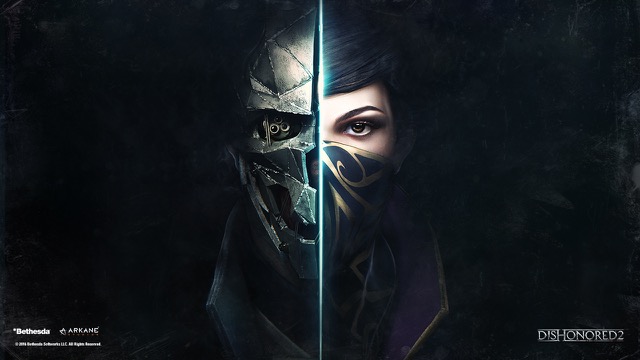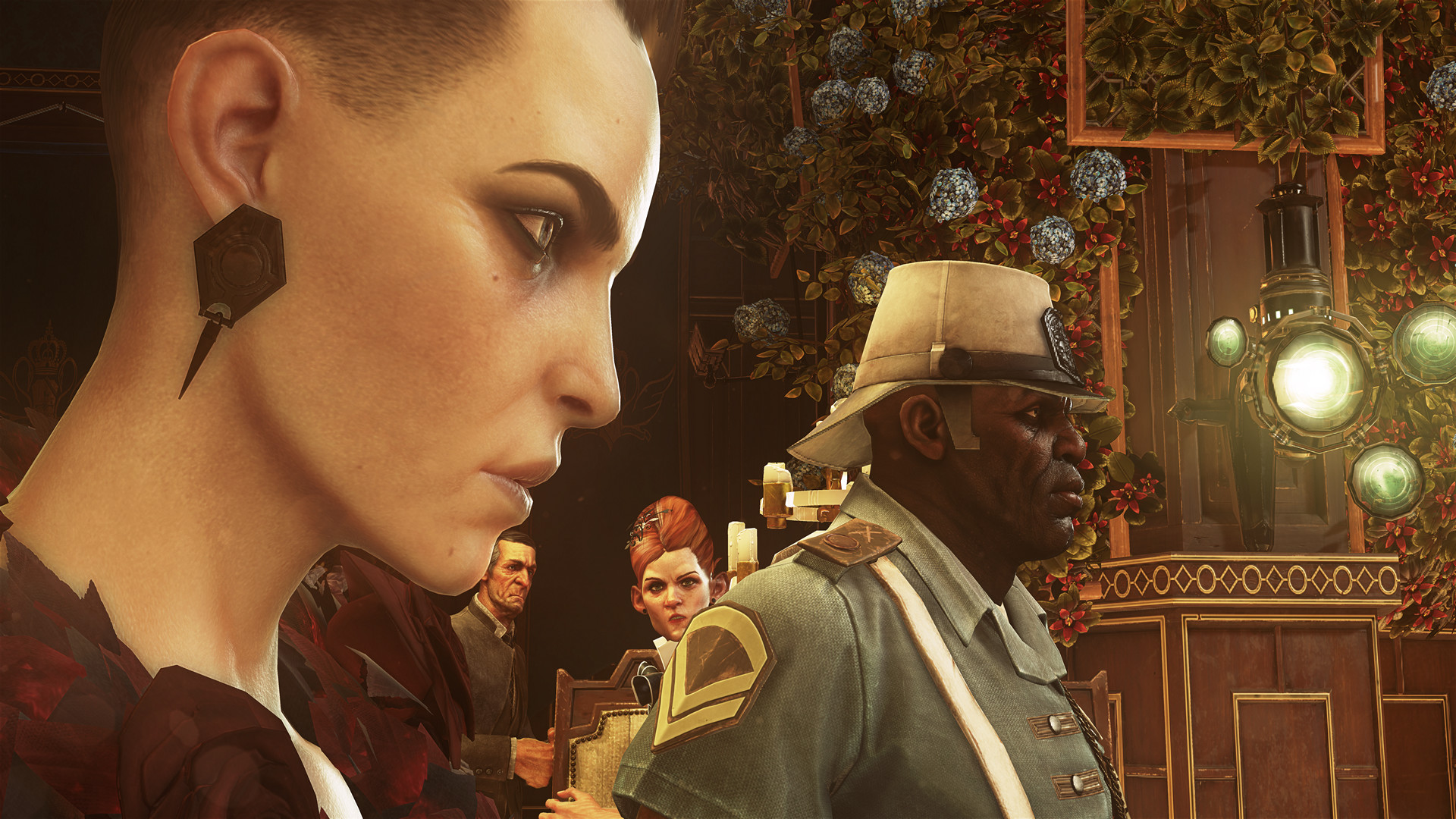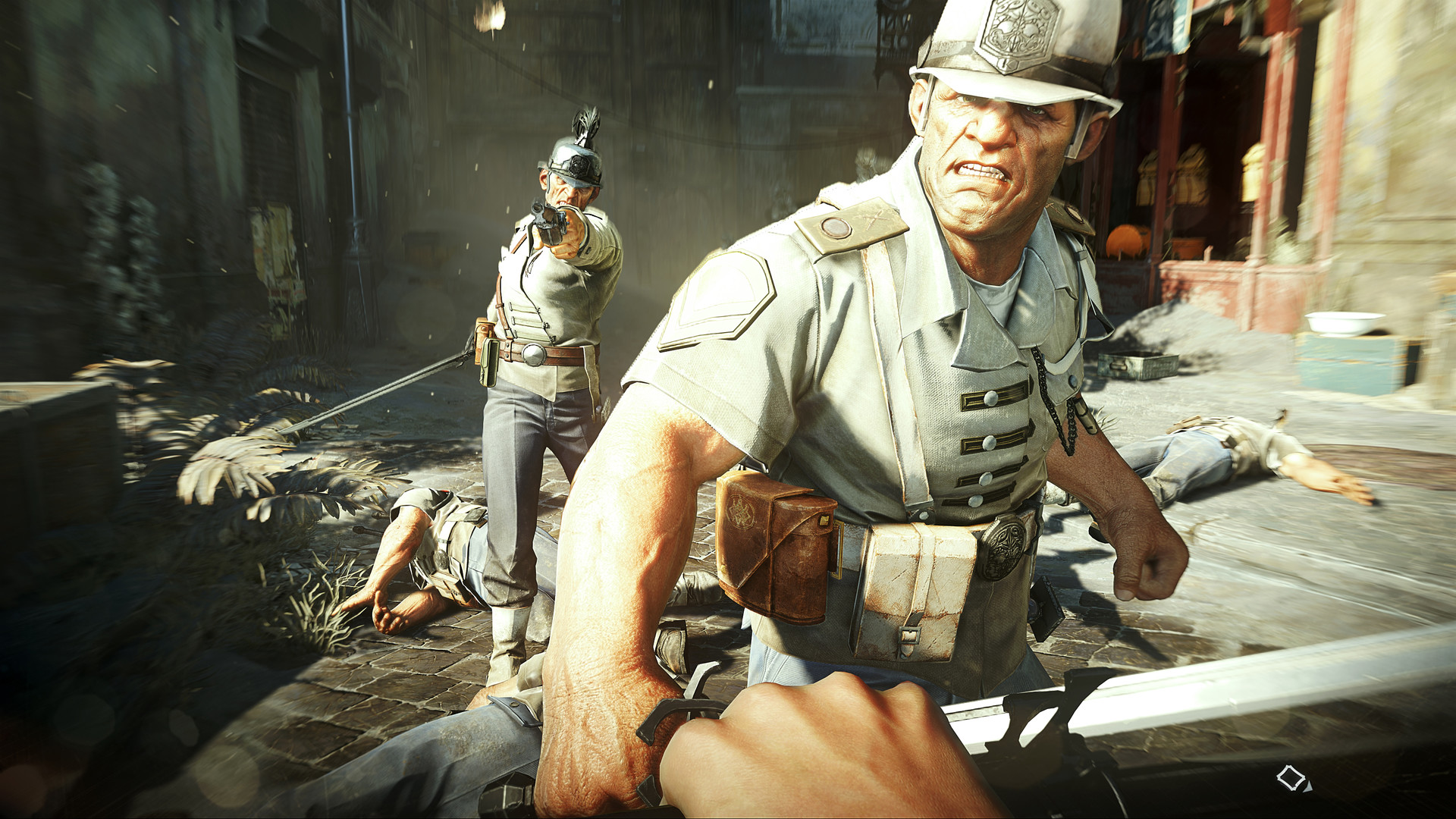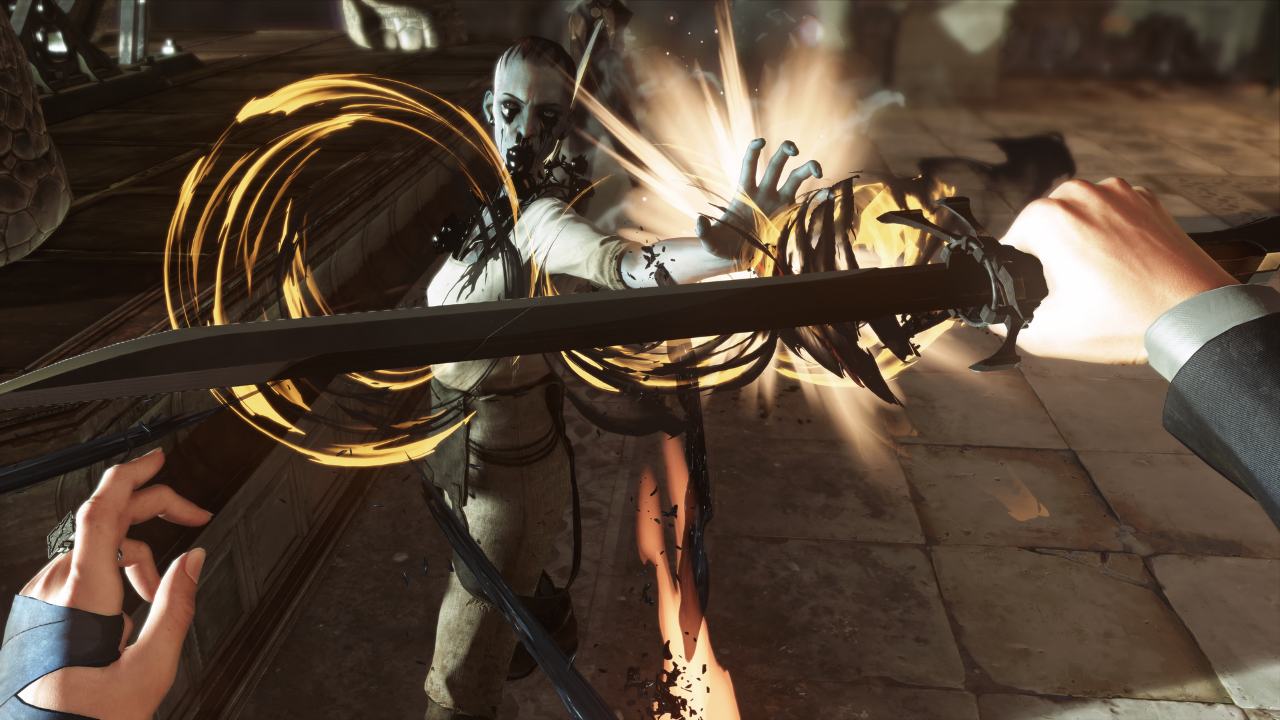Dishonored 2 - Review

There is a lot of stuff that I really love about the Dishonored series. They nailed down stealth gameplay in a way that few other games have ever managed, allowing you to be either brutally efficient killing machine or stealthy, nonviolent avenger. There are so many great things that start to add up to make Dishonored 2 a great game. In many ways it’s better than the first, giving you options that you never knew you wanted until they were presented to you. But in two crucial ways it falls short for me. I like the way that this game plays but the story itself does nothing to pull me through the worlds. It feels like a flimsy excuse to put your characters back into the same situation as they were in during the first game.
You take control of either Emily or Corvo, royal protector or empress herself. The little girl from the first game is all grown up, and for some reason in the interim between the games, Corvo has been teaching her how to be a killer like him. That way there is no gap in skill between the two of them when you make the choice of who to play as at the beginning of the game immediately after they introduce the villain.

The difference between them comes in the power set that each has. By exploring the world, you can find runes, which you can use to upgrade either your physical abilities (health, jump height, etc) which are the same for each character, or their special powers, which differ in important ways. You start with access to one power, either Blink or Far Reach. You will be familiar with Blink from the first game, and Far Reach is Emily’s version of the same movement based power.
Each set of powers and character cater to a certain style of play. Corvo plays basically the same as he did in the first game, and is perfect for an aggressive stealth, dashing through stages and cutting people down. Blink let’s you instantly appear behind your targets on up on ceilings, and you can bend or stop time to take down a whole group of enemies at once. He also can summon a swarm of rats to dispose of bodies and attack enemies or possess targets to sneak around levels, brining people away from groups to safely eliminate them. All of these can combine, letting you jump from possessing dead bodies, to birds and fish, to teleporting behind people and killing them, leaving your rats to erase the traces. It’s fast and brutal, a very offensive style of play, where you always are moving forward.
Emily plays more slowly, but can just be lethal. At first I didn’t quite like the way she felt, as her Far Reach power works fundamentally different than Blink. It felt like I was fighting against it constantly. Unlike Blink, which you can point anywhere you want and teleport, Far Reach automatically locks onto parts of the environment, except it always felt like it was locking onto the wrong part, finding me struggling to get to the places I wanted to go. Once I got the hang of it’s different style of power, it got really cool. Instead of appearing at your target, a giant arm shoots out and grabs it and pulls you over, allowing you to play with momentum to slingshot you all over the level. You can eventually use it to grab items and enemies and drag them to you, letting you really mix things up.
She also has access to possibly the coolest power in the game, coming in the form of Domino, which allows you to link targets together with magic. Once they are linked, any action done to one affects all of them. When fully upgraded you can link up to four targets, allowing you to knock out entire groups with a single sleep dart or stab of a sword. It lets you set up scenarios where if you plan properly and mark the right targets, you can clear out entire sections of a level in just seconds with good use of your powers.

That is what makes this game great. It is a stealth playground that relies on the player to really dig into the intricacies of powers and levels, letting you learn how they interact in unexpected ways. I was crouched atop a light in an abandoned conservatory, sword in one hand and glass bottle in the other. I had spent the last few minutes linking together four targets standing below me so that I could take them all out at once. I pulled myself up here and retrieved the bottle form across the room with far reach. When the moment was right, I threw the bottle against the wall and dropped behind one distracted target to choke them out, but she crumpled in front of me before that could happen.
Before I reloaded my save I looked at the ground below, where one of my targets had stumbled off of the edge in surprise after I threw the bottle. When she hit the floor she died, and took her friends with her. Checking my stats screen before I reloaded, I noticed that the four dead people only counted for 3 kills. They planned for accidents like that and let you experience it. It was a really cool moment, and showed attention to tiny bits of detail that let you believe like you are part of a living and breathing world.
It’s this attention to detail that can make the game feel oddly incomplete. The story is not great this time around. Barely a minute after the games starts you are thrust into the action after the evil Delilah bursts in and stages a coup. She’s the sister of the late empress and you might remember her as the primary antagonist of The Brigmore Witches DLC of Dishonored if you played it (I didn’t). But somehow none of your guards stand up for you, and the one who does is so unfamiliar that when they stab her in front of you it means nothing. You can find a note telling you who she is later, but it carries no impact at all.
Delilah is comically evil for seemingly no reason and her motivations are petty and terrible. But the same could be said of every antagonist (except one) in this game. Everyone who stands against you are truly horrible people. You can use your heart to peer into the true hearts of people and reveal them to you, and at one point as I used this heart on four guards in a row I found that every single one of them liked to rape and murder kids. And they kept this theme of reprehensible people for everyone in the game. Guard or citizen. So why should I spare them?

The first game did a great job of setting up a believable conspiracy against Corvo that allowed him to be put into the situation that he was in, without making everyone in the city bad. He wanted revenge against the people who orchestrated it, not the guards who wanted to capture the man who brutally murdered the Empress. But in this game, it all goes out the window. The bad guys are really bad. The guards are really bad. The shopkeepers are really bad. It was weird to hear Emily at the end of my non-lethal run talking about “no mercy” when I had given mercy to everyone. The whole story felt contrived as a poor excuse for the gameplay. Playing hide and seek with Emily and then saving her was a great set of character moments, but there is nothing like that here.
Luckily the game that the story was built around is fantastic. If you follow us on Twitter, you would have seen me talking about the sound and level design of the game this week, two things that no one has done better in a while. The “Clockwork Mansion” is one of the best and most inventive pieces of level design that I’ve played in a long time. Maniacal inventor, homicidal robots, and a house that shifts around you at the press of a button like something out of an Escher painting.
It forced you to think in a way that you don’t normally have to to get through the level, and there was a moment where I fell through the floor while the house was shifting and all of a sudden a whole different side of the place opened up. Inside of the walls where you could not be seen. Managing to beat the level without ever shifting the house and being detected is one of my most satisfying achievements of the year. With a guide it would be easy. But figuring it out on your own is amazing.
You also have the level “A Crack in the Slab” which adds a fourth dimension to the level, turning one space into three by the time you leave, and actually changing other things in the game outside of that small environment, even if you didn’t realize it when you did them. It allowed you to think around obstacles in ways that I haven’t in a long time. This theme carries through the game, as you try to work out safe codes based on cryptic clues, break into black market shops through unmarked sidequests, and hunt down every last item hidden in the environment. It was full of puzzles that were fun to solve, just not necessary to solve at all. It rewarded sneaking through he city and exploring by giving you so much more. There was more story in incidental conversations than there were in parts of this game. And all you had to do was stop and listen.
It is one of the best playing games I’ve touched in a while, I just wish it gave me a reason to power through some of the levels besides “Revenge, but again”. The story ultimately didn’t matter and the moral choices became a matter of statistics and achievements than actual character development. It cold have been one of the best games of the year, it just ultimately fell short in a crucial area.
3.5/5
Review written for the Xbox One version of the game. Your experience may vary on different platforms.
Our review code can be found here for information on how we write and score our reviews. If you have any questions, comments, suggestions, or concerns, please contact us at contact@deathofthecritic.com
_____________________________________________

Tom has been writing about media since he was a senior in high school. He likes long walks on the beach, dark liquor, and when characters reload guns in action movies.
You Might Also Like:
The Backlog - Middle-earth: Shadow of Mordor
A Case Against Open World Games
Left 4 Dead - A Love Story
_____________________________________________